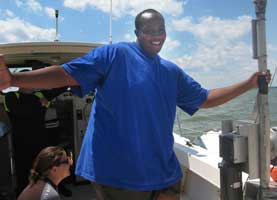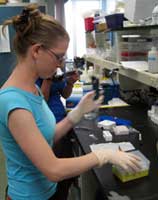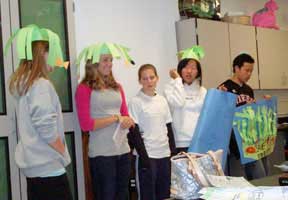 The Scientist Educator Partnership includes an orientation program in which participants learn about their research topics and develop key messages. |
COSEE Coastal Trends supports four-member teams consisting of a research scientist, graduate student, secondary science teacher, and Hampton University undergraduate student. The teams work together for a summer to conduct scientific research on a coastal science topic and collaborate to create web-based educational resources based on the research. The goals of the Scientist-Educator Partnership are to facilitate collaboration between members of the science and education communities and to foster broader understanding of the knowledge gained through ocean science research.
Each team member benefits from participating in the Scientist Educator Partnership program. Scientists create Broader Impacts for their research ForEducators and gain increased understanding of education techniques and communicating complex concepts to non-science audiences. Graduate students gain science communication skills as well as early career education experience. Teachers develop ocean science content knowledge and an increased understanding of the scientific research process, resulting in enhanced preparation for teaching ocean science concepts in the classroom. Undergraduates gain research experience as well as valuable professional contacts. Undergraduates also learn to work in a team-oriented environment.
Responsibilities of each team member are as follows:
- Scientists and graduate students lead research and ensure scientific accuracy of education module
- Teachers lead communication skills and create classroom activities based on their research
- Graduate students oversee the team, scheduling weekly meetings and guiding education module development
- Undergraduate students conduct an independent research project and contribute to module development
For more information on how the Scientist-Educator Partnership program works or how the program participants create "education modules," see Scientist Educator Partnership User's Guide (PDF, 188 KB) and Module Creation Guide (PDF, 133 KB).
Please see the Teacher Research Experience page for information on how to become part of a scientist-educator team.
 |  | | A Scientist-Educator Partnership graduate students demonstrates laboratory research techniques used in microbial ecology | The knowledge gained by Scientist-Educator Partnership research will be disseminated through the classroom lesson plans and resources that each team develops |
|




